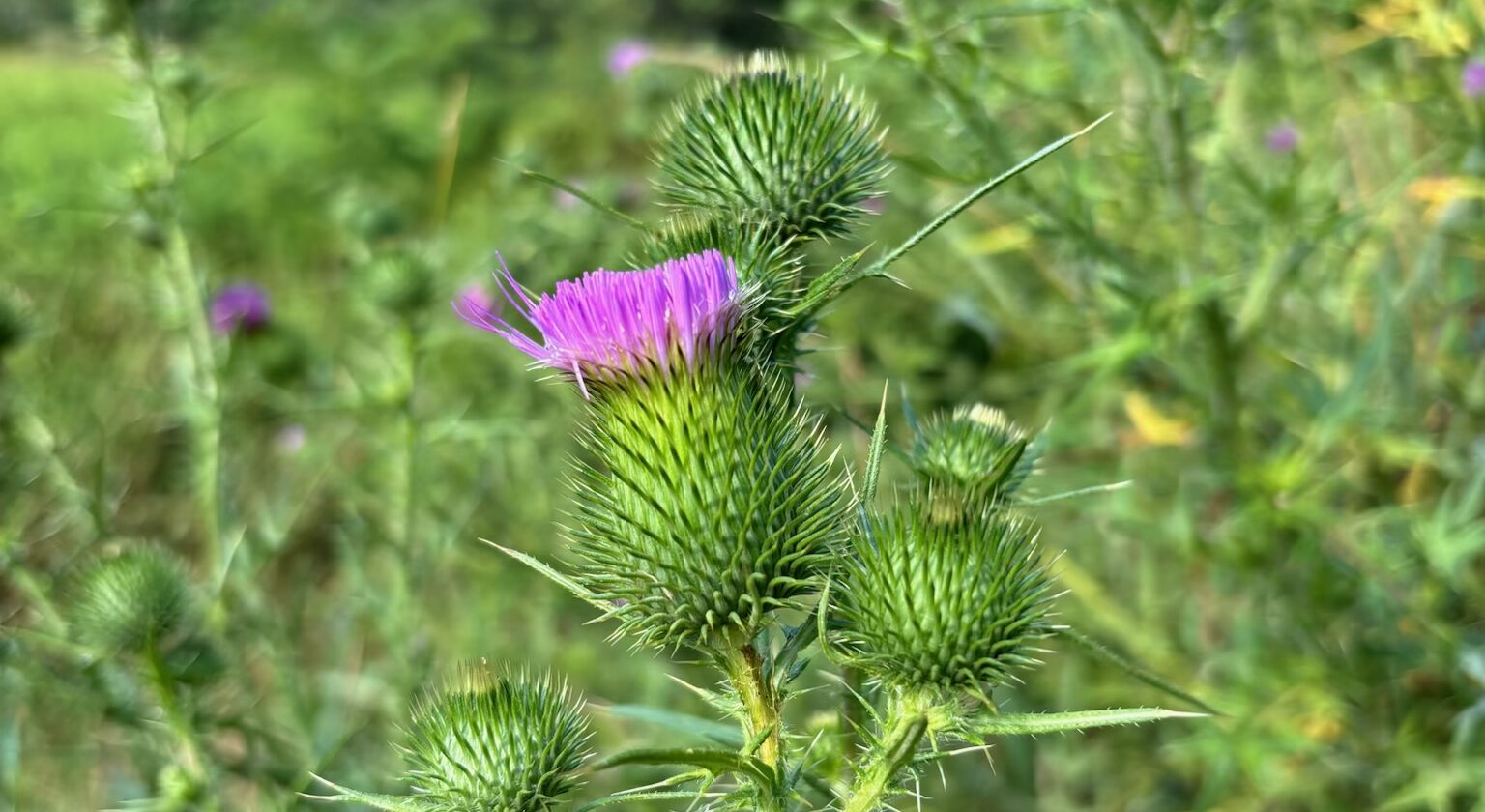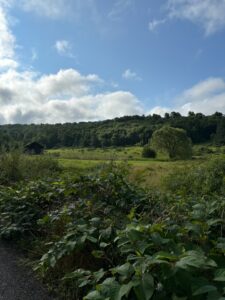
On the walk back I thought about how even though I’ve lived in Pennsylvania for decades, before this summer’s Political Empathy Lab, I used to see Pennsylvania as monochrome shades of green, like that field. Green was the color that rushed by my window if I happened to look while zooming down a highway enroute to a destination. I did not take the time to zoom in, to notice an individual flower, a different purple color punctuating the green.
Zooming in and moving closer is one of the important early take-aways of Political Empathy Lab. The research team did not have a rigid agenda which allowed us to really focus on the mechanisms of connecting with other people. In our best conversations curiosity grew but in just about all of them connection grew. We gave another person our attention and in return they shared with us their thoughts. Often one good conversation with a person translated into a stronger connection to an entire place. We have friends now in towns that dot the state, generating feelings of connectedness with these specific places in Pennsylvania.
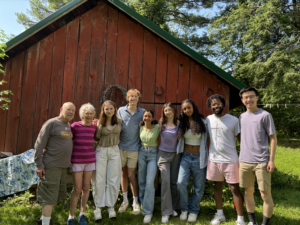
Democratic listening is becoming an ever more important part of the study of deliberative democracy. Where past deliberative democratic theorists spent time on the speech act, more attention is now being given to the listening act. What exactly happens when we listen to each other and how does that increase our potential to understand each perspective as citizens in a democracy? Political Empathy Lab is observing this summer what political science studies substantiate, the idea that people feel more favorably disposed to you (even in cross party discussions) if you let them express themselves and you demonstrate that you are listening by your posture.[1] Again, your responses as you speak are less important than your presence of just showing up and your humility in just listening.
Coming into human contact, unmediated by a screen or a statistical profile with someone who is different from you can be scary and overwhelming. It is that focus on the single purple flower, a flower that has the potential to be prickly to the touch that carries a risk. But time and time again we found in our travels that simply listening to individuals, developed trust quickly and sparked human connection. We very rarely in a conversation came away feeling less connected. The time that it took to interact with individuals, who like the purple flower, illuminated the sea of green, gave more complexity to our understanding of the area.
Proximity in Listening: Encountering Misperceptions, Serendipity and Courageous Politics
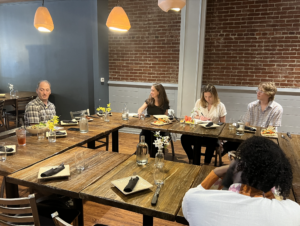
PEL was very fortunate to be hosted by the Penn Club of Western Pennsylvania President Donald Bonk in Johnstown, Pennsylvania. In an interesting conversation with Dave Souter, a reporter at The Tribune Democrat (see coverage of our visit to Johnstown here), we heard about how frustrating it is to be visited every presidential cycle by national reporters with pre written narratives about Johnstown that they prove through a few interviews always at the same place (I believe he said the Coney Island Restaurant) which is not fully representative of all of Johnstown. Residents of Johnstown often feel misunderstood by this type of national coverage. The narrative of former steel (or coal, or railroad or fill in the blank as you travel across the state full of past industries that are now no longer) town former union Democrats, now angry Republicans, is maybe true at one level but it misses many complicating factors and feels uncomfortable to the people that call Johnstown home.
These kinds of overused narratives used to describe Pennsylvania, like the “Philadelphia and Pittsburgh with Alabama in between” attributed to James Carville, also corrode curiosity. We think we “know” the state already (like the green field I observed) and we are less inclined to wonder and be open to having our stereotypes and biases disturbed.
Democratic listening invites us to, as Penn Provost John Jackson shared with PEL during our orientation week “see each person as an ambassador of their own social universe.” They are worthy of our attention and our time and are the only person who can describe their social universe to us. It sparks both intellectual humility, curiosity and just plain openness to people and unheard stories.
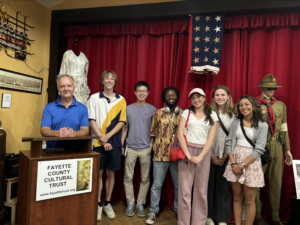
On July 8th we stopped in Connellsville, a town in Fayette County, to visit the Connellsville Canteen. To our dismay, when we arrived we saw that it was already closed. Disappointed, we decided to walk around the town instead. I noticed a man painting a mural and decided to ask him about the Connellsville Canteen. It just so happened that the man painting was Daniel Cocks, Executive Director of the Fayette County Cultural Trust. He dropped what he was doing, unlocked the museum and gave us an hour long tour completely serendipitously. It was so deeply kind.
We learned from Daniel incredible things. You see, the Connellsville Canteen is a museum completely comprised of donations from local residents who fought in World War II. Apparently, right after the bombing of Pearl Harbor, the town had one of the greatest number of enlistments for a town of that size in the U.S. The Connellsville Canteen has pictures and uniforms, items that soldiers brought back from Japan and Germany and so many interesting stories. For example, John Woodruff, an African American track athlete who won a gold for the 800 meters in the 1936 Olympics in Berlin was from Connellsville. When he won the race amidst great odds, he was given an oak tree sapling which he planted in Connellsville and is now a large tree growing near the high school track. Further, a veteran from World War I petitioned the government to create the Veterans Day National Holiday.
The Connellsville Canteen was an important stop for WWII soldiers getting ready to be shipped overseas to stop for a meal, hence its name. The people of Connellsville served meals to 600,000 American servicemen passing through on their way to fight in Europe. Those are just some of the many stories. It was a complete surprise that we got to have the tour and we are grateful to Daniel Cocks.
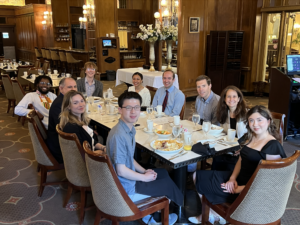
Listening deeply to other people can help break political silos and can make for more courageous politics. We were fortunate enough to meet with former U.S. Congressperson and Penn Alum (both undergraduate and Penn Law), Conor Lamb while in Pittsburgh. In a special election in 2018, Lamb, a Democrat, ended up winning an area that had voted 20+ points in 2016 for Trump. He did so by breaking with the Democratic party on certain issues that he knew were bridges too far to cross for his district. He decided not to go deeply into culture war issues but stayed with the economy. Conor Lamb is smart, kind and clearly knows how to listen. Sitting with him over breakfast at the William Penn Inn in Pittsburgh, we heard about what it was like to navigate his party membership and his responsibility to fully represent his district. It was important to him that the Democratic party learn how to better listen to and understand his district. It is deeply courageous and complex and helps disrupt our polarized and geographic and information siloization.
My views on specific issues have not changed from our visit around the state, but I have met people who hold different views than mine, views shaped by their geographic reality, and I have a bit more context.
In the book Missing Each: How To Cultivate Meaningful Connections (2021), Edward Brodkin and Ashley Pallathra elucidate the theory of attunement comprised of listening, understanding, mutual responsiveness and relaxed awareness. It gives people the opportunity to practice connecting with others face to face using muscles that may be out of practice due to our digital world. The PEL research team used these skills all over the state in order to get a more nuanced picture of our political landscape, one that is more than just monochrome.
Pennsylvania is a swing state made up of individuals who are Red and Blue, the colors of Penn, the colors of our political parties, together they make purple, like my purple flower. Political Empathy Lab is discovering that it is worth taking the time to zoom in closer in order to listen to each Pennsylvanian. It will help you better understand our beautifully complex (and sometimes prickly) political landscape.
[1] Matthew S. Levendusky and Dominik A Stecula We Need to Talk Cambridge Elements Experimental Political Science (New York, Cambridge University Press: 2021)
Mary F. Scudder Beyond Empathy and Inclusion: The Challenge of Listening in Democratic Deliberation (New York: Oxford University Press, 2020).

